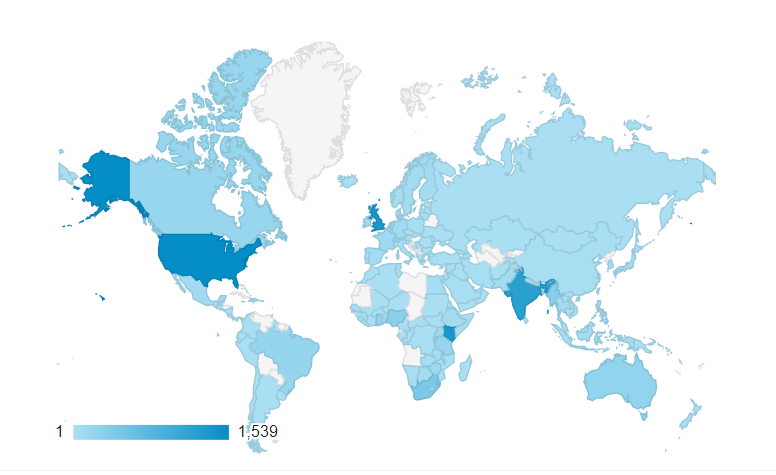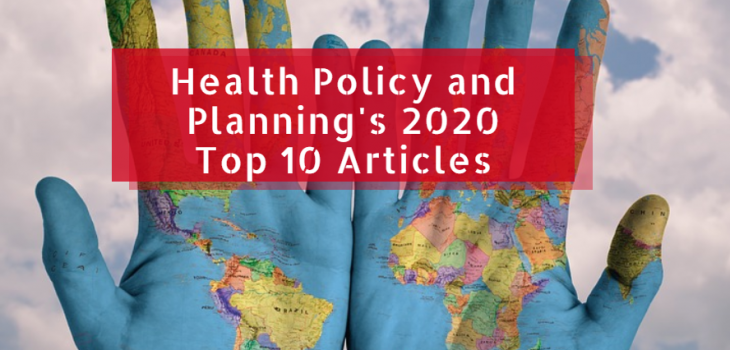By Natasha Salaria (London School of Hygiene & Tropical Medicine)
The 2020 impact factors are now out as of this month and what a year it has been. We are pleased to announce we have seen an increase in our impact factor which has gone up to 3.344 with our 5-year impact factor coming in at 3.902. This keeps us in Quartile 1 of the Health Policy and Services category (19th out of 88 journals).
As we are all aware, the usage of impact factors is widely contested as a means of assessing journal impact, and we at the London School of Hygiene & Tropical Medicine have signed the Declaration on Research Assessment (DORA) which recognises the need to improve how research is assessed. However it is undeniably still widely recognised by authors, publishers, libraries and academic departments as an indicator of citation rates to journal articles.
After delving into some of the citation data, we would like to share our top 10 most highly cited articles that contributed to the 2020 impact factor in Health Policy and Planning:
- Original article: Disrespectful and abusive treatment during facility delivery in Tanzania: a facility and community survey
- Original article: The cost of not breastfeeding: global results from a new tool
- JOINT 3RD
– Review: The impact of cash transfers on social determinants of health and health inequalities in sub-Saharan Africa: a systematic review
– Review: Integrated mental health services in China: challenges and planning for the future - Original article: How do external donors influence national health policy processes? Experiences of domestic policy actors in Cambodia and Pakistan
- JOINT 5TH:
– Original article: Towards an understanding of resilience: responding to health systems shocks
– 10 best resources: 10 best resources on power in health policy and systems in low- and middle-income countries
– Review: The silencing of political context in health research in Ethiopia: why it should be a concern - Original article: Mental health system costs, resources and constraints in South Africa: a national survey
- Original article: Jeopardizing quality at the frontline of healthcare: prevalence and risk factors for disrespect and abuse during facility-based childbirth in Ethiopia
- JOINT 8th:
– Review: Community health volunteers could help improve access to and use of essential health services by communities in LMICs: an umbrella review
– Original article: Priority setting for health in the context of devolution in Kenya: implications for health equity and community-based primary care
– Original article: The investment case for hepatitis B and C in South Africa: adaptation and innovation in policy analysis for disease program scale-up - Original article: Dissatisfaction with current integration reforms of health insurance schemes in China: are they a success and what matters?
- Original article: Strengthening mental health system governance in six low-and middle-income countries in Africa and south Asia: challenges, needs and potential strategies
| Contributions by country/region | Count | Contributions by organizations | Count |
| UNIVERSITY OF LONDON | 50 | USA | 104 |
| LONDON SCHOOL OF HYGIENE TROPICAL MEDICINE | 44 | ENGLAND | 73 |
| HARVARD UNIVERSITY | 27 | SOUTH AFRICA | 26 |
| JOHNS HOPKINS UNIVERSITY | 15 | CANADA | 23 |
| UNIVERSITY OF CALIFORNIA | 13 | AUSTRALIA | 22 |
| UNIVERSITY OF CAPE TOWN | 11 | SWITZERLAND | 18 |
| WORLD HEALTH ORGANIZATION | 11 | KENYA | 14 |
| MAKERERE UNIVERSITY | 9 | INDIA | 13 |
| RUPRECHT KARLS UNIVERSITY HEIDELBERG | 8 | TANZANIA | 11 |
| UNIVERSITY OF SYDNEY | 8 | GERMANY | 10 |
*These data summarize the top 10 countries/institutions for papers published in 2018 and 2019 i.e. the impact factor window. The ‘record count’ values mean that at least one author listed on any paper is affiliated with the named institution or is from the listed country. It is meant to be descriptive rather than comparative.
Our top 10 contributions by organizations include high performing higher education institutions such as Johns Hopkins, Harvard University, University of Cape Town, University of Makerere and the World Health Organization.
The journal has wide reach and publishes papers from authors in over 75 countries, many from low- and middle-income countries who are able to utilise our reduced rate or free access countries list.
In 2020, our blog audience included readers from Kenya, India, UK, USA, South Africa, Nigeria, Myanmar, Ghana, Australia and Brazil.

Altmetric
Altmetric is an alternative metric to the impact factor, used to demonstrate engagement with journals on an individual article level. Altmetric collects data on universal popularity and uptake, including within policy documents to show how research has influenced health policy as well as media outlets and social media platform discussions.
There have been 61 policy documents including out content by 12 unique policy sources in 8 countries including policy documents in the World Bank, the National Institute for Health and Care Excellence, Food and Agriculture Organization of the United Nations and the World Health Organization.
Here are the Top 10 articles from 2020 with the highest Altmetric score published in Health Policy and Planning:
- Commentary: Tuberculosis control and care in the era of COVID-19
- Commentary: What role can health policy and systems research play in supporting responses to COVID-19 that strengthen socially just health systems?
- Original article: Providers’ perceptions of disrespect and abuse during childbirth: a mixed-methods study in Kenya
- Original article: The state of diet-related NCD policies in Afghanistan, Bangladesh, Nepal, Pakistan, Tunisia and Vietnam: a comparative assessment that introduces a ‘policy cube’ approach
- Review: Social values and health systems in health policy and systems research: a mixed-method systematic review and evidence map
- Commentary: Climate change: an urgent priority for health policy and systems research
- Original article: Intersectoral (in)activity: towards an understanding of public sector department links between water, sanitation and hygiene (WASH) and childhood undernutrition in South Africa
- Methodological Musing: Document analysis in health policy research: the READ approach
- Review: Health system resilience: a literature review of empirical research
- Original article: Applying a complex adaptive systems approach to the evaluation of a school-based intervention for intimate partner violence prevention in Mexico
Don’t forget to check out our latest outputs including:
- [RESEARCH COLLECTION] Evidence to inform the COVID-19 Response
- [PODCASTS]
– To Bend without Breaking: A Qualitative Study on Leadership by Doctors in Sierra Leone
– Effectiveness of containment and closure policies across income levels during the COVID-19 pandemic
– Impact of campaign-style delivery of routine vaccines using routine health services data in India - [SUPPLEMENTS] Watch this space for a 2021 supplement publishing in November in collaboration with Health Systems Global
- [EDITOR’S CHOICE ARTICLES]
- [NEW INNOVATION & PRACTICE REPORTS GUIDELINES]











